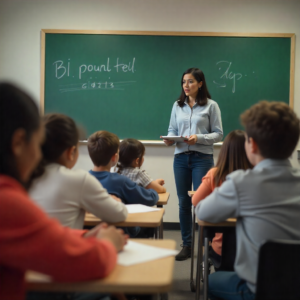
Schools Want AI, Teachers Are Scared: How Leaders Can Bridge the Trust Gap
Discover practical AI approaches that help teachers save time and teach more creatively – by reducing admin work, enhancing lesson ideas, and supporting student engagement

Academic performance in present-day competitive environments is the only measure of being successful in institutions of learning. These learners have bright academic records and are better placed to receive best education opportunities, enhance their careers, and gain more education in general. However, various drawbacks, including weak student involvement, unimaginative methods of teaching, and poor parental support, plague the progress of most students. It is high time such problems are solved not only to improve the individual performance of the students but also to ensure a better future for the society as a whole.
Comprehend the fundamental factors that influence academic achievement.
Success and failure at school constitute a complex interplay of internal and external factors that influence one another. Therefore, school focuses on tailor-made strategies addressing these areas.
It’s not about quick fixes. This is an improvement of learning and performance, based on research and strategies that address major issues students have.
Maintaining student engagement in the classroom presents a notable challenge; nonetheless, enhancing classroom engagement substantially influences academic learning.
1. Strategies to Improve Engagement:
2. Encourages student participation.
3. Technology is in your corner.
4. Respond promptly.
The responsibility of parental engagement to promote student success in school is highly important, yet often underappreciated. For starters, by engaging the parents positively, it creates an enabling environment that encourages constant progress in academics.
A collaborative and multifaceted approach, therefore, would be required to enhance school-level academic outcomes. Involvement in classroom atmosphere, interactive teaching methods, mental health support, and ensuring parental input have the potential to take it further than a successful development of all students. SEL is an essential factor for developing emotional intelligence and resilience, thus affecting improved academic outcomes directly. With these proven strategies in place, schools can develop a culture that is both inclusive, engaging, and supportive for their students.
Boosting academic performance in schools requires joint action. This means that schools, educators, parents, and students must work together to create an environment where learning takes place. That may include social-emotional learning (SEL) programs, enriching classroom environments’ design, and active parental involvement encouragement.
For those that are seeking a motivating and highly effective way of including Social-Emotional Learning in their school, a personalized demonstration of TomoClub may be requested to see how it changes the process of learning, which can then be incorporated in the most engaging and appealing manner by students.

Discover practical AI approaches that help teachers save time and teach more creatively – by reducing admin work, enhancing lesson ideas, and supporting student engagement

Discover a clear, actionable process for schools to integrate AI with purpose – by aligning goals, upskilling staff, selecting the right tools, and building a future-ready learning culture that supports both teachers and students.

Discover practical AI approaches that help teachers save time and teach more creatively – by reducing admin work, enhancing lesson ideas, and supporting student engagement

Discover practical strategies for school leaders to transform staff conflicts into collaboration – by fostering open communication, building trust, and implementing proven approaches that strengthen
Explore insightful articles and updates that keep you abreast of the evolving landscape of education, ensuring you stay ahead in your educational journey.